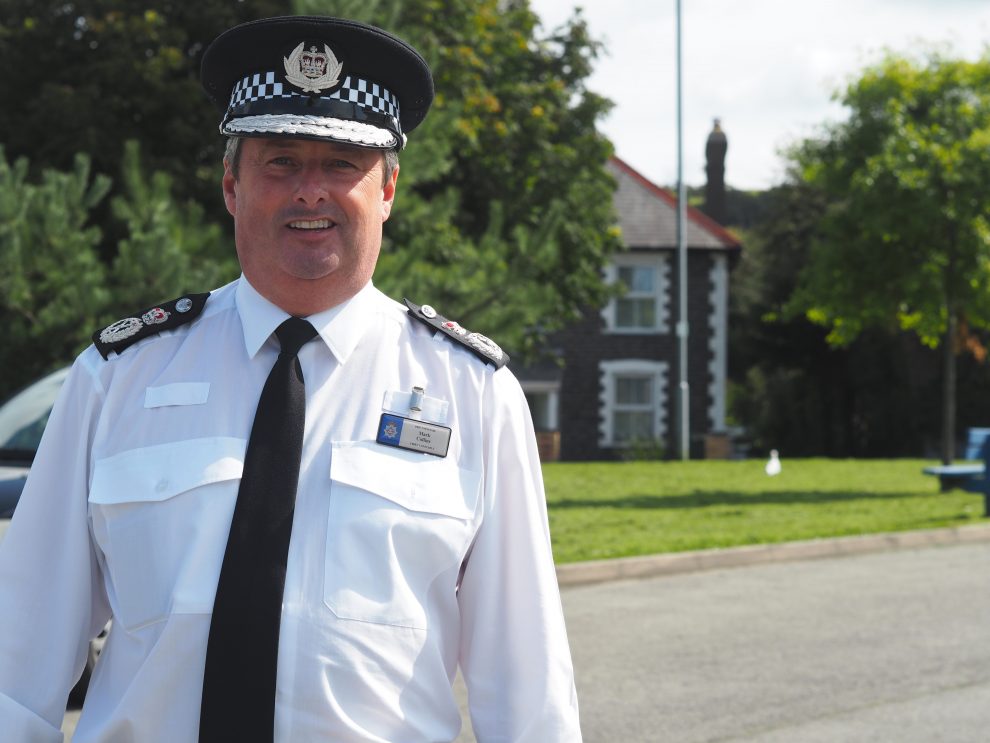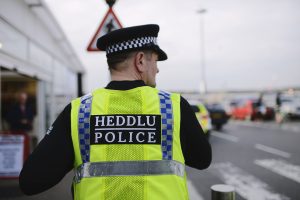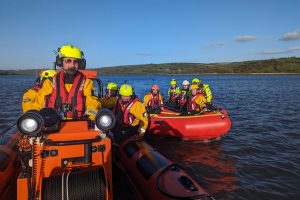WHEN Mark Collins put on his volunteer police uniform for the first time in 1987, he could never have guessed that 29 years later he would be walking through the doors of Dyfed-Powys Police headquarters as the chief constable.
Mr Collins has worked his way up the ranks from a PC to the chief constable, but his policing career actually began as an unpaid officer volunteering his time to the force he now leads.
As the force celebrates National Volunteers Week, Mr Collins looks back over the four years he spent in the Special Constabulary and reveals what the police service gains from its team of volunteer officers.
Inspired in part by conversations with local officers in the Carmarthenshire village he grew up in, and partly from watching dramatic incidents unfold on TV series The Bill, Mr Collins was keen to join the police service as a teenager.
He decided firstly to enrol as a Special Constable so he could gain an insight into the role of a PC, and to find out if it was the right career for him.
“I thought I wanted to be a police officer, but not being from a policing background I wanted to find out what it was really like first,” he said.
“It was great to get in and see how the police worked – the roles and responsibilities of an officer, and the variety of things they dealt with. Having joined as a Special, it made me more hungry to join as a regular officer.”
After completing his initial training, Mr Collins went out on his first patrol shift as a Special Constable, supported by a regular officer.
“I spent my first shift travelling around north Carmarthen with Rhian Thomas, a rural officer, going to a number of calls,” he said.
“One memory that stands out is when we visited an elderly lady just outside Carmarthen. We dealt with some problems she had, and it turned out that she was a lady in her own right. We must have made an impact because she then invited us to a garden party.
“Knowing that you have helped someone is hugely rewarding, and as a Special it meant a lot to receive that invitation.”
A milestone for all officers is making their first arrest, and Mr Collins remembers his clearly. He was called to a report of a theft from a supermarket in Carmarthen, and arrested the culprit on the spot.
But he admits he was feeling a mixture of emotions as he put his training into practice.
“I was excited, but also nervous and anxious,” he said. “Was I going to get it right? Was I going to present the evidence to the custody sergeant correctly? It was a big deal, and something I definitely didn’t want to get wrong.”
Considering the perception of Specials, Mr Collins said a lot had changed over the years, with people’s attitudes towards volunteer officers becoming more positive, and more opportunities being opened up to volunteer officers.
Specials at Dyfed-Powys Police have worked on a mental health triage team, established the Specials on horseback scheme, and piloted a joint response unit with the Wales Ambulance Service over the Christmas period when demand increases on both services.
“If I’m honest, the training for Specials in the 80s wasn’t that good, and the support wasn’t that good,” Mr Collins said. “Regulars used to call them hobby bobbies back in the day, and they would only attend fetes and carnivals. You would occasionally get to walk the beat, but you didn’t have all the kit and equipment that we have now.
“We have moved on so much. We have a rank structure within the Special Constabulary, Specials are on the frontline with the same powers as fully warranted officers; they are better equipped; they carry out stop searches and warrants; and play an important part in policing operations.
“We recognise the specialist skills people can bring in from other jobs and the qualities they can bring to the force without needing to join as regular officers.”
Specials must be aged over 18, and must commit to a minimum of 16 hours each month to the force. While Mr Collins accepts that for many it is a way in to the police service, he would like to see more people apply with the aim of becoming ‘career Specials’ – those who are happy to continue as volunteers alongside their day-to-day roles.
“I would like people to see it as a way of supporting their communities, rather than as part of an aspiration to join the police service,” he said.
“It is a chance to do something different. There is so much reality TV, things like 24 Hours in Police Custody and Police Interceptors, and people are drawn in by the cut and thrust of policing – the fast response, blue lights flashing side of things.
“But policing isn’t all about that – there are the 2am patrols, traumatic incidents like attending sudden deaths or collisions, breaking the news that loved ones have passed away. Specials get the chance to dip into all that without giving up their day jobs.”
“For me, volunteering as a Special was the start of my policing career.
“Putting on your uniform for the first time is quite something, and it was a proud moment for both me and my family. And while I joined with aspirations of becoming a regular officer and a detective, never did I think when I walked through the doors of headquarters for the first time that I would walk back in 29 years later as the chief constable.”

















Add Comment